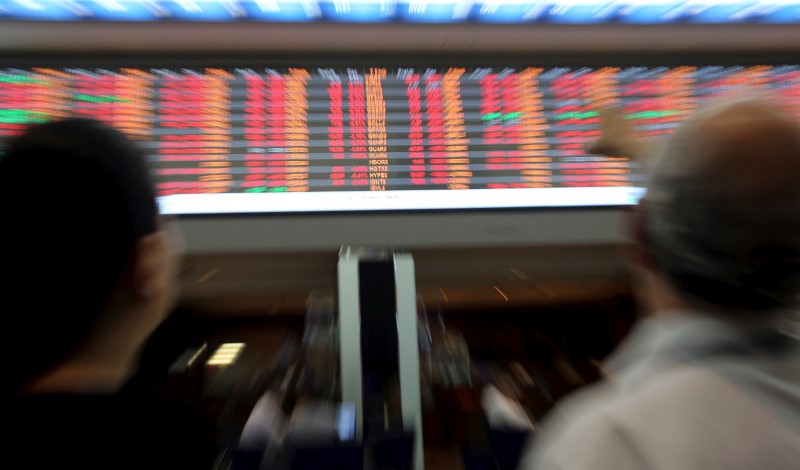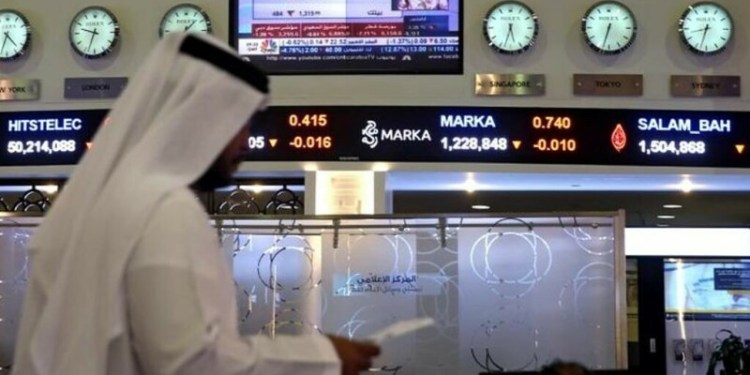 © Reuters. FILE PHOTO: People look at an electronic board on the floor of Brazil’s BM&F Bovespa Stock Market in Sao Paulo
© Reuters. FILE PHOTO: People look at an electronic board on the floor of Brazil’s BM&F Bovespa Stock Market in Sao PauloBy Bruno Federowski
SAO PAULO (Reuters) – Despite record stock prices and a stable currency, a red warning light is flashing on the dashboard of Brazil’s financial markets.
Fund managers point to a steepening of the yield curve for government debt as a sign of rising concerns about next year’s wide-open presidential race – and they are betting that anxiety will spread to other asset classes.
The accepted wisdom on trading desks in Brazil’s financial capital of São Paulo is that any new president would maintain the current agenda of structural reforms to avert a fiscal crisis and bolster a fragile recovery from a deep recession.
Yet bond markets appear increasingly skeptical of that rosy scenario.
The spread between yields on the Brazilian government’s 2018 and 2023 local-currency debt, a gauge of medium-term uncertainty, hit a record high last week.
“The steepness of the yield curve indicates that the market is demanding a premium because of the electoral process,” managers at Vista Capital wrote in a letter to investors. “Why would it be different with other assets?”
With Brazil’s central bank steadily cutting its benchmark interest rates, the Bovespa benchmark stock index () hit an all-time high this month. It is up nearly 30 percent this year, roughly in line with MSCI’s emerging markets index ().
Brazil’s currency, the real, () has been steady for months as investors welcomed austerity efforts by President Michel Temer’s center-right administration. The pricing of credit default swaps and inflation-linked bonds also suggests investors are sanguine about political risks.
Yet corruption scandals and high unemployment are stoking resentment of Brazil’s political class, raising the prospect of an anti-establishment candidate winning next year’s race with promises to scrap Temer’s reforms.
The election is still a year away, and polling at this point in Brazilian campaigns rarely delivers accurate predictions.
Still, surveys show left-leaning former President Luiz Inácio Lula da Silva, who has railed against austerity, leading the field of possible candidates despite a recent bribery conviction.
Lula is barred from running if the ruling is upheld on appeal. Polls suggest, in that scenario, part of his support would pass to strident former lawmaker Ciro Gomes, another leftist critic of Temer’s program.
The runner-up to Lula in recent surveys is far right congressman Jair Bolsonaro, whose comments on economic policy have been erratic.
Bolsonaro has questioned the use of higher interest rates to control inflation and defended the state-led development policy of Brazil’s military government in the 1970s, but he has made recent overtures to the business community.
Support for a more free-market agenda has been split among possible candidates such as São Paulo Governor Geraldo Alckmin, São Paulo Mayor João Doria and Finance Minister Henrique Meirelles. The fragmented field makes it hard to gauge the make-up of a likely second-round vote.
COLD FEET
The uncertainty in Brazil adds to the political question marks in Latin America next year, when elections in Mexico and Colombia will also test the region’s recent shift toward more orthodox economic policy.
Brazil’s steepening yield curve may be the first evidence of investors getting cold feet about political risks.
While a 600-basis-point reduction in interest rates by the central bank since October with an additional 75 basis-point cut expected this week could account for part of the steepening in the yield curve, the move is too pronounced to be explained by monetary policy alone, investors say. Long-term bond prices are consistent with the central bank hiking interest rates as high as 11 percent by 2021, according to calculations by managers at Flag Asset Management, far above a median 8 percent forecast in the central bank’s weekly poll of economists.
In addition, the central bank’s recent suggestion that it would slow rate cuts did nothing to flatten the curve, as would be expected.
Fund managers say that longer-term bond yields are also being lifted by concerns that Temer may fail to push through substantial spending cuts ahead of the 2018 vote, in particular a flagship pension reform.
While some fund managers expect stocks and the currency to fall, to bring them into line with the weakness in the bond market, others are betting that long-term bond yields are likely to fall as political uncertainty eases.
Fund manager Vintage Investimentos expects them to meet halfway. It has combined positions that would benefit from a flatter yield curve with investments in inflation-linked local bonds. In a quarterly investor letter, Vintage managers granted that long-term yields should be high to account for the fiscal and electoral risks but said current levels are “excessive.” ING economist Gustavo Rangel said such trades are likely to become more common as the election approaches, but it may take time for prices to fully incorporate the uncertainty. “Electoral noise will affect local assets next year, but political risk should not be priced in until late in the first quarter,” Rangel wrote in a report.
Source: Investing.com



























